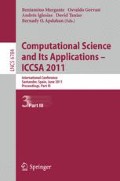Abstract
A pseudo-triangulation is a planar subdivision into pseudo-triangles - polygons with three convex vertices, used mainly in motion planning problems in robotics. As it is a rather new concept, not too many algorithms to construct it exist. In this paper, we propose an on-line version of incremental insertion, with generalized flips to improve the shape of pseudo-triangles. This algorithmic paradigm is often used for Delaunay triangulations, but for pseudo-triangulations it has been used only in an off-line version (for sorted input points). We also experimented with several optimization criteria for the flips and show their influence on the shape of pseudo-triangles.
Access this chapter
Tax calculation will be finalised at checkout
Purchases are for personal use only
Preview
Unable to display preview. Download preview PDF.
References
Aichholzer, O., Aurenhammer, F., Krasser, H., Speckmann, B.: Convexity minimizes pseudo-triangulations. In: Proceedings of the 14th Canadian Conference on Computational Geometry, pp. 158–162 (2002)
Aichholzer, O., Rote, G., Speckmann, B., Streinu, I.: The Zigzag Path of a Pseudo-Triangulation. In: Dehne, F., Sack, J.-R., Smid, M. (eds.) WADS 2003. LNCS, vol. 2748, pp. 377–388. Springer, Heidelberg (2003)
Aichholzer, O., Aurenhammer, F., Krasser, H., Brass, P.: Pseudo-triangulations from surfaces and novel type of edge flip. SIAM Journal on Computing 32, 1621–1653 (2003)
Brönnimann, H., Kettner, L., Pocchiola, M., Snoeyink, J.: Counting and enumerating pseudo-triangulations with greedy flip algorithm. SIAM Journal on Computing 36, 721–739 (2007)
Chazelle, B., Edelsbrunner, H., Grigni, M., Guibas, L., Hershberger, J., Sharir, M., Snoeyink, J.: Ray shooting in polygons using geodesic triangulations. Algorithmica 12, 54–68 (1994)
Kettner, L., Kirkpatrick, D., Mantler, A., Snoeyink, J., Speckmann, B., Takeuchi, F.: Tight degree bounds for pseudo-triangulations of points. Computational Geometry - Theory and Applications 25(1-2), 3–12 (2003)
Kirkpatrick, D., Snoeyink, J., Speckmann, B.: Kinetic collision detection for simple polygons. In: Proceedings of the 16th ACM Symposium on Computational Geometry, pp. 322–330 (2000)
Kirkpatrick, D., Speckmann, B.: Separation sensitive kinetic separation structures for convex polygons. In: Akiyama, J., Kano, M., Urabe, M. (eds.) JCDCG 2000. LNCS, vol. 2098, pp. 222–236. Springer, Heidelberg (2001)
Kolingerová, I., Trčka, J., Žalik, B.: The stochastic walk algorithms for point location in pseudo-triangulations (2011) (manuscript)
Műcke, E.P., Saias, I., Zhu, B.: Fast randomized point location without preprocessing in two- and three-dimensional Delaunay triangulations. In: Proceedings of the 12th Annual Symposium on Computational Geometry, pp. 274–283 (1996)
Pocchiola, M., Vertger, G.: Computing the visibility graph via pseudo-triangulations. In: Proceedings of the 11th Annual ACM Symposium on Computational Geometry, pp. 248–257 (1995)
Pocchiola, M., Vertger, G.: The visibility complex. Proceedings of the International Journal of Computational Geometry and Applications, 279–308 (1996)
Pocchiola, M., Vertger, G.: Pseudo-triangulations: theory and applications. In: Proceedings of the 12th Annual ACM Symposium on Computational Geometry, pp. 291–300 (1996)
Randall, D., Rote, G., Santos, F., Snoeyink, J.: Counting triangulations and pseudo-triangulations of wheels. In: Proceedings of the 13th Canadian Conference on Computational Geometry, pp. 149–152 (2001)
Rote, G., Wang, C.A., Wang, L., Xu, Y.: On constrained minimum pseudotriangulations. In: Warnow, T.J., Zhu, B. (eds.) COCOON 2003. LNCS, vol. 2697, pp. 445–454. Springer, Heidelberg (2003)
Speckmann, B., Tóth, C.D.: Allocating vertex π-guards in simple polygons via pseudo-triangulations. In: Proceedings of the 14th ACM-SIAM Symposium on Discrete Algorithms (SODA), pp. 109–118 (2003)
Streinu, I.: A combinatorical approach to planar non-colliding robot arm motion planning. In: Proceedings of the 41st Annual Symposium on Foundations of Computer Science (FOCS), pp. 443–453 (2000)
Author information
Authors and Affiliations
Editor information
Editors and Affiliations
Rights and permissions
Copyright information
© 2011 Springer-Verlag Berlin Heidelberg
About this paper
Cite this paper
Kolingerová, I., Trčka, J., Hobza, L. (2011). Construction of Pseudo-triangulation by Incremental Insertion. In: Murgante, B., Gervasi, O., Iglesias, A., Taniar, D., Apduhan, B.O. (eds) Computational Science and Its Applications - ICCSA 2011. ICCSA 2011. Lecture Notes in Computer Science, vol 6784. Springer, Berlin, Heidelberg. https://doi.org/10.1007/978-3-642-21931-3_3
Download citation
DOI: https://doi.org/10.1007/978-3-642-21931-3_3
Publisher Name: Springer, Berlin, Heidelberg
Print ISBN: 978-3-642-21930-6
Online ISBN: 978-3-642-21931-3
eBook Packages: Computer ScienceComputer Science (R0)

